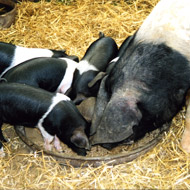
Committee votes in EU-wide ban
EU member states will have up to five years to phase out the use of zinc oxide at medicinal levels in piglet feed before a ban comes into effect.
The Standing Committee on Veterinary Medicinal Products (CVMP) voted in favour of the ban in Brussels on Monday (19 June).
It will now be up to the UK government to decide whether to allow the maximum transition period in this country, unless Brexit heralds a different approach.
The decision has received mixed views among the pig sector. The transition period falls short of the 10 years campaigned for by the National Pig Association (NPA) and other industry bodies, but avoids immediate withdrawal of the marketing authorisations.
NPA chief executive Zoe Davies said: “We knew this was coming but that doesn’t make the outcome and the process behind it any more palatable. We had hoped for longer as we believe the industry will need at least 10 years to adapt to life without this vital health tool.
“But it could have been a lot worse if the industry alliance we were part of had not made such a powerful argument for more time.”
The NPA is lobbying for the maximum five-year transition period and is hopeful of government backing. But the association will also explore whether Brexit will affect the way the UK handles its decision.
Ms Davies added: “We must now use the transition period, if zinc does go in the UK, to ensure, first and foremost, that the health and welfare of pigs are not compromised by the decision. We are concerned about the timing – losing zinc could put a major spanner in the works as the industry collectively seeks to reduce antibiotic usage on farms.
“It is encouraging that some farms are already starting to experiment with removing or reducing zinc levels from piglet diets but already we are seeing this can have unintended consequences."
Zinc oxide is widely used in the EU to prevent and control post-weaning diarrhoea and bowel oedema disease in young pigs. It is estimated that around 70-90 per cent of starter diets in the UK contain therapeutic levels of the compound.
Late last year the European Medicines Agency (EMA) Veterinary Committee concluded that zinc oxide in piglet feed should be withdrawn as the benefits are outweighed by the risk to the environment and co-selection of antimicrobial resistance.



 The veterinary mental health charity Vetlife is inviting the veterinary community to join it for a sponsored cold-water dip.
The veterinary mental health charity Vetlife is inviting the veterinary community to join it for a sponsored cold-water dip.